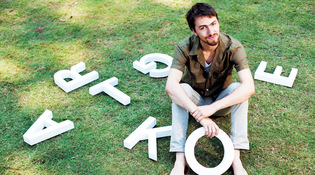 loading
loading
Light & VerityFun in all directionsA crossword maven of 21  Jessie Gladin-KramerOliver Hill ’12 writes crossword puzzles for the New York Times. View full image
Constructing a crossword puzzle, says Yale senior Oliver Hill, is a lot like writing a pop song. By his 21st birthday this summer, Hill had already published 16 puzzles in the New York Times. If that’s a predictor of his musical success, well, keep your ears open for his band, Plume Giant. A music major raised on classical violin, Hill says that in the cases of both puzzle-building and songwriting, “it’s more of an art than a science. The very seedling of making it is purely creative—you have to come up with a theme. Then there is a plug-and-chug element of finding the rhymes” to complete a song’s lyrics, or, in a crossword, “filling the white squares with letters that are fun in all directions.” Everyone loves a clever theme. But Hill puts equal emphasis on the rest of the grid, which is sometimes treated as filler. “You don’t want to put in, like, the name of a genus of squirrels, where people say, ‘What the hell is that?’ That’s no fun.” Instead, he shoots for “anything that has a sensory connection, like snap peas. Or ‘Hey Jude’: you fill it in and then you’re singing the tune. It’s those answers that make a puzzle fun to solve.” As a constructor, Hill also delights in “the science” of making it all fit together. “It’s kind of like doing a problem set for a physics class,” he says: “a really fun employment of a couple different parts of my brain. And addictive.” The addiction—when he’s working on puzzles, it’s for “no less than 5 hours at a time, and usually 30 hours or something over the course of a week”—began in Hill’s mid-teens. He starting solving crosswords with his dad, then fooled around with making his own. One day, listening to NPR, he heard an interview with “a personal hero,” Times crossword editor Will Shortz. “He made an offhanded reference to living in Pleasantville, New York”—Hill’s hometown. “So I looked him up and, lo and behold, he lives like 12 houses away from me. So I shot him an e-mail. I thought he’d be a big shot. But he was way psyched that there was a 15-year-old from his town who was into crosswords. When I knocked on his door and gave him a crossword, it was the first time he had accepted one in person.” Accepted as in received, that is: “The first one I gave him was total crap,” Hill concedes. It took “probably six months” until he produced one that Shortz wanted to publish. The Internet is rife with crossword-constructing software. One program boasts that “most puzzles for the New York Times and other publications are made” with its help. But young Hill is old school. “It seems a little bit like a computer writing a song,” he says. “It could do it, but I can’t imagine it’s going to be as good.”
The comment period has expired.
|
|